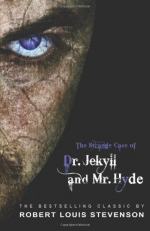|
|
Dr. Jekyll and Mr. Hyde Chapter 10 - Henry Jekyll's Full Statement of the Case
For the benefit of his friend, Mr. Utterson, Dr. Jekyll leaves a testimonial confession.
Jekyll was born to fortune and as a doctor, was guaranteed a high position in life. Even as a young man, however, Jekyll had a penchant for base pleasures. Although he seemed respectable in public, he wanted to live a life of duplicity. With such a view, his scientific experiments turned mystic and transcendental. From his ideas, he observed,
"With every day, and from both sides of my intelligence, the moral and the intellectual, I thus drew steadily nearer to the truth, by whose partial discovery I have been doomed to such a dreadful shipwreck: that man is not truly one, but truly two." Chapter 10, pg. 104
In his desire to separate the two sides of his nature--good and evil--Jekyll musters up the courage to test his theory of man. The first time he drinks the potion, he describes a transformation that is physical, mental, and even a bit spiritual. In this new life, he feels the essence of his evil nature. Jekyll theorizes that the bodily representation of Hyde is smaller because his evil side is not as developed as his life of effort and virtue. In looking at the mirror, he feels that the Hyde nature is the livelier and more natural one than his Jekyll side. In short, Edward Hyde, "alone in the ranks of mankind, was pure evil" (pg. 108). He drinks the concoction once more and turns back into the respectable Henry Jekyll.
At this moment, he is at a crossroads--what should he do with this profound, new knowledge? He succumbs to the possibilities of living a life outside of his dry, old self. He prepares by finding a place in Soho, creating an identity of Hyde, and drafting the will to protect himself against financial loss in case something happens his Dr. Jekyll side. As Hyde, what begins as adventures in depravity turns more and more monstrous. Although there are incidents to cause suspicion (e.g. the accident with the little girl), he is able to cover his tracks. Yet, as time passes, it seems as though the Hyde character is taking greater hold of his life. In addition, he finds that he must increase the dosage of the drug to gain the desired effects. Sooner or later, he has to choose between the two, Jekyll or Hyde. About their relatedness, he writes, "Jekyll had more than a father's interest; Hyde had more than a son's indifference" (pg. 114).
Jekyll chooses to cast off Hyde. But he does not get rid of Hyde's place in Soho and his clothes. For two months, a determined Jekyll tries to live the wholesome life of the doctor. But he is tortured by the longings of Hyde, who lives free of the constricting boundaries of proper society. He finally succumbs and drinks the potion again. This time, the effect of the change is stronger than ever. In a mad rage, the transformed Hyde kills Sir Danvers Carew. Afterwards, in tears of repentance, Henry Jekyll undergoes a torment of the spirit. Now that it is dangerous to be Hyde, he feels that his torment is over. So for a couple of months, Dr. Jekyll attempts to redeem himself by working hard to relieve the suffering of others. But eventually, he cannot completely escape from his corrupted nature.
One day, as he is sitting on a park bench, he thinks about his good deeds and compares himself with others. At that moment of pride, he finds that he is unexpectedly changed from Dr. Jekyll to Edward Hyde. Fearful of being caught and in need of the drug, the transformed Hyde writes a desperate letter to Dr. Lanyon, in Dr. Jekyll's hand, requesting the materials for the drug. Hyde is more visibly evil when he is threatened. The letter states: "That child of Hell had nothing human; nothing lived in him but fear and hatred" (pg. 120).
After the episode with Dr. Lanyon, Jekyll finds it increasingly difficult to maintain his old self. Even with increased dosage, he constantly faces the risk of turning back into Hyde. Now, with the salt running low, Jekyll sends Poole all over London to look for the same type as the original. The new salt is ineffective. Jekyll figures that the impurity of the first batch made the drug work. Jekyll has nearly lost hope. He looks in the mirror and realizes that he may never be Jekyll again. He even fears that this letter will be destroyed if, in the act of writing, he turns into Hyde. So Jekyll does what he feels is the only thing left to do to rid of Hyde--kill himself. Jekyll concludes:
"Here then, as I lay down the pen and proceed to seal up my confession, I bring the life of that unhappy Henry Jekyll to an end." Chapter 10, pg. 124



